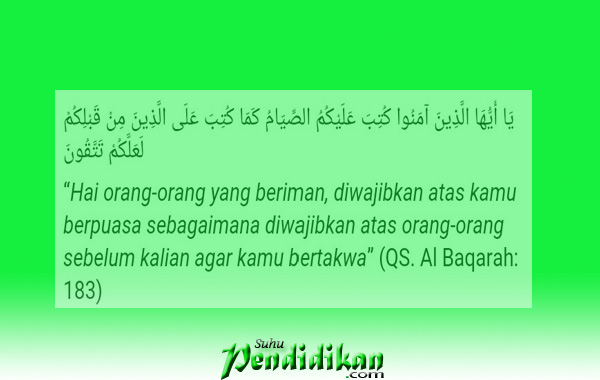The intention to break the fast
Intention to break the fast that is, especially iftar for Ramadan, we may already know it by heart, it means that the majority of us have memorized it. Because this prayer is always said or always heard during the full fasting month, either on TV media or social media after the maghrib call.
The intention to break the fast
The following is a prayer for breaking the fast when fasting is obligatory, namely fasting in the month of Ramadan after previously we discussed about Pillars of Fasting

Allohumma lakasumtu wabika aamantu wa'alaa rizkika aftortu birohmatika ya arhama rohimin
That means :
O Allah because of you I am fasting, with you i believe, to you I surrender and with your sustenance I break my fast, by YOUR grace, O God the Most Merciful.
Read Also : Break Fast
Breaking Fast Video For Children
Regarding the obligation of fasting Ramadan, Allah SWT says that in the letter of Al-Baqorah verse 183

And also the words of the Prophet SAW which means:
"From Ibn Umar ra that the Messenger of Allah (may peace be upon him) said : Islam was founded on 5 base that is: testify that there is no god but Allah and that Muhammad is the messenger of Allah. set up prayers, pay zakat, fasting in the month of Ramadan and performing Hajj if possible
Differences of Opinion about Iftar Prayer
From this prayer, there are some people who think it is not authentic,and they express their intentions below
ذَهَبَ الظَّمَـأُ، وابْــتَلَّتِ العُرُوقُ، وثَــبَتَ الأَجْرُ إِن شَاءَ اللهُ
'Dzahaba-zh Zama'u, Wabtalati-l ‘Uruuqu wa Tsabata-l Ajru, God willing’
That means :
"I have lost my thirst, the veins are wet, and got the reward, insya alloh”
Lately, the long -standing breaking of fast prayer practiced by most people is being questioned in some quarters. according to them, prayers recited by the community, yaitu “Allâhumma laka shumtu wa bika âmantu wa‘ alâ rizqika afthartu,” supported by a hadith that is weak or less authentic
A number of parties offer alternatives to the pronunciation of prayers that are supported by the authentic hadith narrated by Abu Dawud, yaitu “Dzahabaz zhama’u wabtallatil‘ urûqu wa tsabatal aer, Insya Alloh.”
The question is, is it true that the iftar prayer that is practiced by most people so far only relies on the hadith that is weak?? if it is true that the quality of the hadith narrated by Abu Dawud regarding iftar prayer is more authentic than the hadith practiced by most people so far?
Let's look at the following information.
The complete hadith narrated by Abu Dawud reads as follows:
حدثنا عبد الله بن محمد بن يحيى أبو محمد حدثنا علي بن الحسن أخبرني الحسين بن واقد حدثنا مروان يعني ابن سالم المقفع قال رأيت ابن عمر يقبض على لحيته فيقطع ما زاد على الكف وقال كان رسول الله صلى الله عليه وسلم إذا أفطر قال ذهب الظمأ وابتلت العروق وثبت الأجر إن شاء الله
That means, "We got the narration from Abdullah bin Muhammad bin Yahya, namely Abu Muhammad, we get the narration from Ali bin Hasan, we get the narration from Hussein bin Waqid, we got the story from Marwan, namely Bin Salim Al-Muqaffa', he said that I saw Ibn Umar gripping his beard, then trim the rest. He said, Rasulullah when breaking his fast read, ‘Dzahabaz zhama’u wabtallatil‘ urûqu wa tsabatal aer, insyâ Allah ’,” (HR Abu Dawud)
While the fast -breaking prayer is practiced by the community, yaitu “Allâhumma laka shumtu wa‘ alâ rizqika afthartu,” sourced from the narration of Imam Bukhari and Muslim as the following evidence of Sheikh M Khatib As-Syarbini:
وأن يقول عقب فطره اللهم لك صمت وعلى رزقك أفطرت لانه صلى الله عليه وسلم كان يقول ذلك رواه الشيخان
That means, “(Those who fast) recommended after breaking the fast, ‘Allâhumma laka shumtu, wa ‘alâ rizqika afthartu.’ The reason, Rasulullah SAW recited this prayer narrated by Imam Bukhari and Muslim,” (See Sheikh M Khatib As-Syarbini, Al-Iqna pada Hamisy Bujairimi alal Khatib, [Beirut, Darul Fikr: 2006 M/1426-1427 H], juz II, page 385).
If you look at the level of validity, The prayers narrated by Bukhari and Muslim are clearly clear and more authentic than just the narrations of Abu Dawud, which is based on the agreement of hadith scholars.. From this it is clear that the prayers practiced by the community are correct and supported by authentic and strong hadiths.
Then what about the prayer narrated by Abu Dawud?
Because knowing there is a prayer from the history of other narrators, scholars from the Shafi'i Madhhab combine the prayers narrated by Imam Bukhari and also Muslim with the prayers narrated by Abu Dawud.
That is what Sulaiman Bujairimi mentioned in the following Hasyiyatul Bujairimi:
اللّهُمَّ لَكَ صُمْتُ( ويسن أن يزيد على ذلك وَبِكَ آمَنْتُ، وَبِكَ وَعَلَيْكَ تَوَكَّلْتُ. ذَهَبَ الظَّمَأُ وَابْتَلَّتِ العُرُوقُ وَثَبَتَ الأَجْرُ إِنْ شاءَ اللهُ. يا وَاسِعَ الفَضْلِ اِغْفِرْ لِي الحَمْدُ لِلهِ الَّذِي هَدَانِي فَصُمْتُ، وَرَزَقَنِي فَأَفْطَرْتُ.
“(Allâhumma laka shumtu wa ‘alâ rizqika afthartu) it is recommended to add pronunciation, wa bika âmantu, wa bika wa ‘alaika tawakkaltu. Dzahabaz zhama'u, wabtallatil ‘urûqu, wa tsabatal air, insyâ Allah. Yâ wâsi‘al fadhli, ighfir lî. Alhamdulillâhil ladzî hadânî fa shumtu, wa razaqanî fa afthartu,” (See Sheikh Sulaiman Al-Bujairimi, Hasyiyatul Bujairimi alal Khatib, [Beirut, Darul Fikr: 2006 M/1426-1427 H], juz II, page 385).
That means :
“My God, only for you i fast. With your sustenance I cancel it. Because and to you I surrender. The thirst is gone. The veins were wet. And God willing, the reward is fixed.
O Substance of Great Gifts, Forgive me. Praise be to God who guides me, Then I fasted. And praise be to God who gave me sustenance, then i canceled it.”
From this description, we are able to draw the conclusion that the earlier scholars were very wise in overcoming the differences in history. They combine 2 different history without negating, blame, or even downplay other histories.
The combination of these two narrations was then presented to the community which was then practiced for generations by them until now. This prayer is read after they break their fast.
Suggestion that we as humans should not exaggerate the differences. We should not blame the community's breaking the fast prayer, especially if their practice is supported by a more authentic hadith than the alternative prayers offered. other than that, We should look for a meeting point between two different histories. This wisdom is the legacy of the previous scholars. Wallahu a'lam.
Difference is grace
May be useful
The post Niat Buka Puasa appeared first on this page.